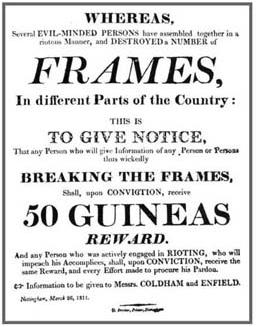
Organization of handicraftsmen in 19th century England.
The Luddite movement originated in England's industrial region of Nottingham in 1811 and over the next two years spread through the neighbouring shires. Contrary to general belief the Luddites ( "the Ludds") did not oppose the introduction of machines but tried to stop the decline of the prices that forced them to work longer and longer hours.
Before the introduction of factories knitters and weavers worked in their own homes and supported their income with small gardens. Once they were forced into factory work their health quickly declined, and they hed no more time to look after a garden or animals. As a witness from the time described his situation:
At first people sent petitions into Parliament asking for relief from the practices of the manufacturers, but with no success. In 1811 desperate knitters stole the jack wires out of knitting frames and deposited them in churches as "hostages" for the good behavior of their owners. When that did not help the Luddites organized themselves into self-help groups. They did not support violence against people but went on nightly raids during which masked men entered factories and wrecked their machines. The Luddite song "General Ludd's Triumph" said:
|
The guilty may fear, but no vengeance he aims |
The movement had widespread support in the general population. It was violently suppressed by the capitalists, first through actions of individuals but soon through actions of the state as well. In 1812 the industrialist Horsfall ordered the shooting of a captured band of Luddites; he was soon killed in revenge. Eventually the government dispatched 12,000 soldiers to put an end to the movement. In 1813 a mass trial at York resulted in many hangings and in deportation to Australia.
The movement saw a short revival in the economic crisis of 1816 but ended soon after as a result of violent suppression.
Durvall, F. O. (1969) Popular Disturbances and Public Order in Regency England. Oxford University Press, London.
Some individuals and small groups within the environmentalist movement of today call themselves "Modern Luddites" or "Neo-Luddites" to indicate their opposition to the use of modern technology for anti-social applications such as destructive logging, nuclear power and emission of greenhouse gases.

A poster of 1811:
|
WHEREAS, |